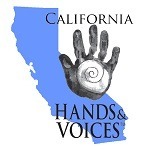by Brittany Comegna
Admissions Counselor at the National Technical Institute for the Deaf at the Rochester Institute of Technology
I did everything that I now tell students to NOT do.
I was a senior in high school at California School for the Deaf in Fremont. I was encouraged by teachers and school staff to attend a certain university after having submitted my application. I concurrently applied to California State University at Northridge (CSUN) where my older Deaf brother was attending. I had my heart set on a career in the film industry and believed CSUN could offer a lot in this area. I graduated from CSUN in December of 2010.
Honestly, I was unwilling to explore other options.
I have to admit a couple things with you. I did not make any official college visits. I did not thoroughly review the curriculums. I did not view job placement information. I did not read any reports. I did not review any mission statements or values. I did not outreach to any alums outside of my inner circle. I did not compare financial aid awards.
Seven years following my senior year, I became employed by the Rochester Institute of Technology as the west coast and interpreting program admissions counselor after having completed my graduate study at RIT.
The goal of this article is to impart tips to those of you who are reaching the fork in the road of your child’s exciting life journey because I support an informed decision making process. Please share the list with your child.
- Seek out job shadowing opportunities
- Do not shy away from asking; a lot of folks are proud of their work and would love to share a few hours of their time.
- Tuition continues to increase so the more a student knows before identifying career plans, the better finite financial resources can be managed as a result.
- Observe how communication is utilized in the workplace. Are there accommodations in place? Consider how this may influence career goals.
- Attempt to go on mock interviews
- It may feel odd to ask people to share their time for this purpose but the reality is a lot of companies are hungry for new talent to add to the company and this requires building a pipeline of prospective employees. A few hours’ investment on their part could create a possible new hire for them a few years down the road.
- Start building the resume
- For some, there may not be a lot of content to add and that is understandable. My recommendation is to focus on the skills area. Spend quality time pondering where skill sets are (are they within trade-related careers or within computing or related to the arts?)
- Look for reputable career self-assessment surveys online and at the school guidance office
- Assessments are wonderful tools, and it is likely, after at least two different assessments, patterns may emerge that indicate where and what type of employment would be a great fit.
- Those of us at NTID typically use a certain career assessment at our Explore Your Future summer camp for DHH sophomore and juniors known as the Self-Directed Search.
- Get involved in sports, clubs, camps, and team building experiences
- I encourage this because employers want well-rounded individuals. Interaction with people of different backgrounds will help us expand our mindsets and skills. Furthermore, we can engage in self-reflection following those experiences in order to identify our strengths and areas of challenge. We can begin a dialogue with our families and guidance counselors about possible careers and interests that may play to our strengths!
- Visit all types of post-secondary institutions locally
- This includes trade schools, community colleges, four year colleges, etc.
- Think about their offerings, the atmosphere, the opportunities available, the support and resources, and the people at those places. Is that where you feel at home? Is that where you could excel? Where would the path lead to? Is that a destination you want in your journey?
- Visit colleges that serve DHH students as well
- In California Cerritos, Santa Ana, Mt. San Antonio, Santa Rosa, Palomar, Ohlone, and Pierce Community Colleges, and Los Angeles Trade Technical College are among those that I have visited in the past.
- Review colleges’ accreditation(s), job placement information, internship/co-operative education programs and services, access and support services for disabled students, and compare curriculums!
- Visit disability services offices
- A DHH student may be registered into a course with the world’s best professor but that is meaningless if their communication access needs are not available or effective. Certain schools are better prepared in the provision of services for DHH students than others.
As a person who plays a somewhat pivotal role in students’ post-secondary planning journeys, I continue to remind myself that college is not always the only option nor is college always the best choice for everyone.
Those career assessments, mock interviews and job shadowing experiences, visits to different institutions, and resumes come into handy during conversations that involve your child’s future. Ask questions of your child about their experiences. Encourage your child to elaborate on their responses.
Every journey is unique and wonderful in their own right.
In the words of Buzz Lightyear, “To infinity and beyond!”
Brittany Comegna is an Admissions Counselor at the National Technical Institute for the Deaf at the Rochester Institute of Technology in Rochester, NY where over 1,200 DHH students attend. Email with any questions!
